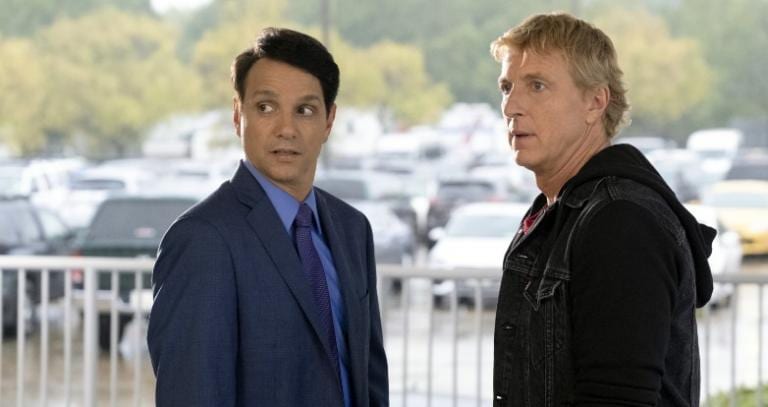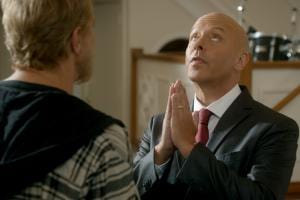
I’ve seen Karate Kid, but it’s not a cultural touchstone for me (my ’80s were more about Prince and Miami Vice), so I’m not going to come at Cobra Kai with reverence. But after binging through all the seasons, including the new third season, on Netflix this past week, I have an appreciation for what an accomplishment it is.
Living in the Ripples
My writing mentor, writer/producer David Milch, gave me a nugget of writing wisdom that’s become somewhat of a mantra: the story is not in the rock but in the ripples, not so much in what happens, but what happens because of what happens.
Cobra Kai lives entirely in the ripples, exploring the rocks thrown into people’s lives, especially in their youth, that made them who they are, and the ripples into the future from the rocks they threw — and continue to throw — themselves.
Choices have consequences; injuries leave scars; old joys never fade entirely, and neither do old hurts. This flies in the face of the modern notion of complete self-actualization.
In this age of the atomized individual, many fancy themselves as self-creations, able to disentangle from the past and shoot forth into the future, all shiny and new.
To a degree, that can happen. But it’s also true that all of our choices and actions continue to live within us. We don’t need to be dominated by the past, but it can’t be wiped away either. And, sooner or later, the choices we made and the things we did, good and bad, circle back.
The Comics Saga of Cobra Kai
By teasing apart writer Robert Mark Kamen’s original Karate Kid movies and characters and extending their stories into the past and future, showrunners, Jersey boys and friends Josh Heald, Jon Hurwitz and Hayden Schlossberg have done what is normally only reserved for comic-book stories these days.
Essentially, Cobra Kai is a comic-book saga, complete with heroes, villains and lots of fighting. Having also binged lately through the Marvel movies, the similarities are striking. But unlike Marvel tales, it began as a movie, and credit goes also to the actors who brought the characters to life.
When I first saw Karate Kid, actor William Zabka, who played the heavy, San Fernando Valley rich kid Johnny Lawrence, caught my attention. There was something about Zabka’s performance that gave Johnny a vulnerability under his tough exterior, that hinted at an abused and misused kid (the story did as well).
Honestly, I preferred Johnny to wrong-side-of-the-tracks New Jersey transplant Daniel LaRusso (Ralph Macchio), who was kind of a jerk. And this is coming from someone who would have been way more Daniel in high school than Johnny.
Telling Johnny’s Story
While Cobra Kai is Daniel’s story as well as Johnny’s, it’s mostly Johnny’s — and Zabka (who has been a co-executive producer on 20 episodes) continues to crush it. He’s equally believable as a jerk, a white knight, a broken-down boozer and a leader. That’s not easy.
So, the two frenemies — and by extension, their teen kids and the kids’ friends and enemies — battle it out through karate across the San Fernando Valley (actually, mostly Atlanta, Georgia, with a bit of Southern California, and in season three, a little Okinawa).
One of the constant messages of Daniel’s karate mentor, Mr. Miyagi (played by the late, great Pat Morita) was balance, and that’s what the show goes for. The good guys aren’t all good, and the bad guys aren’t all bad (OK, one is, but you get to see how he got there). There is virtue in both aggression and restraint, in toughness and gentleness, in forgiveness and justice.
Nobody gets caricatured; everybody is human. Like the best of comic-book stories, Cobra Kai doesn’t make its villains mustache-twirling Snidely Whiplashes (look him up, kids).
Where Are the Parents?
Cobra Kai is a lot about absentee or bad fathers, and that’s at the core of many (if not most) of our current problems. It also tackles what it means to be a man, and what true masculinity is, without pandering to woke sensibilities or demonizing traditional manhood.
Of course, it’s not all great. While the fights aren’t entirely without physical consequences, the social and especially legal implications are too often downplayed. Two-thirds of what goes down in Cobra Kai would, in the real world, end in criminal charges, massive civil litigation or both.

Most bizarrely, aside from the main adult characters, parents are shockingly absent. Kids are trained and even brainwashed by their karate senseis, are out at all hours of the day and night, severe injuries are sustained, property is destroyed — and parents are nowhere to be seen.
Perhaps this might have flown in the ’80s, but in this era of helicopter parenting, if anything’s a throwback to another time, or even entirely farcical, this is it.
On the other hand, I might have thought the idea of karate gangs marauding across middle-class neighborhoods was nuts — until some of what I saw in 2020.
A Touch of Faith
Briefly in season two, and again in season three, faith raises its head, in the person of one of Johnny’s high-school buddies, Bobby (Ron Thomas), who is now a pastor (the running gag where he keeps being called a priest and denies it, is pretty funny).
Unfortunately, for a show that’s so much about forgiveness and redemption, there’s really only one scene where God is invoked as the ultimate forgiver of sins, but it’s more than we get in most modern TV, so I can work with that.
By the way, Zabka is also a proud Christian. As he told SonomaChristianHome.com:
I’m not ashamed. I am a Christian. God’s brought me though many, many, many things. Without Him, I wouldn’t be here right now.
Celebrating the Go-Go ’80s
No decade is without struggle or trouble, but in many ways, the ’80s were pretty great — great economy by the end of it, great movies, music, and a general uplifting spirit. The mid-to-late-’80s and most of the ’90s were a little vacation from history for many Americans, ending with staggering abruptness on Sept. 11, 2001. Nothing has quite been the same since — and now, well, you know.
Cobra Kai is soapy, sometimes silly, occasionally insightful and all-over fun (but, I have to warn you, there’s plenty of violence, salty language and some suggested — but not seen or teen — sex).
It’s also a reminder not to let today’s modern secular Puritans, in their crusade for political correctness and stern adherence to their version of proper language and right thought, destroy the joy, freedom and optimism many felt during the ’80s.
All three seasons of Cobra Kai are currently streaming on Netflix.
Images: Netflix
Don’t miss a thing: Subscribe to all that I write at Authory.com/KateOHare














